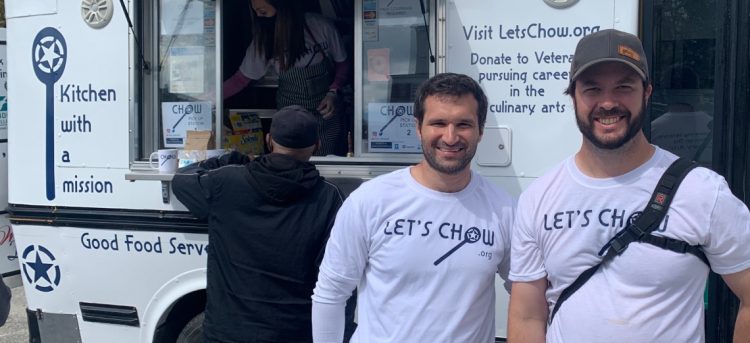Jordan Foley and Charlie Magovern started Chow because they wanted to change the way nonprofits approached vocational training for veterans and military spouses. Their in-the-nitty-gritty approach to culinary education is proving to be the perfect way to help a veteran leave the service and start a career in the culinary industry with real-word experience through food truck training.
Working out of a food truck is the perfect microcosm of culinary management skills because it requires everything from marketing and starting a generator to mincing onions. Chow is helping dozens of veterans and military spouses become business owners each year. What’s more, they’ve created a program that also feeds the soul. Because service is such a big part of the American heroes’ DNA, they’ve created a social service component of Chow that allows the food trucks to visit food insecure communities and provide aid like vaccine registration assistance all over Maryland, DC, and Virgina.
What Makes Chow Different than Other Food Trucks?
Just about everyone associates the word “chow” with food and it also harkens to the military roots of Foley and Magovern and their mission to help veterans and their spouses train for a career post service. Chow is honoring America’s veterans by providing a pathway to business ownership for aspiring culinary professionals.
Chow is innovative. They teach everything from menu sourcing and marketing as well as how to prepare delicious meals. They are the only model in the nation that provides veterans and their spouses with digital and hands-on food truck training.
Chow is reducing barriers. This summer their group of students includes four women of color who will soon be making a powerful impact in their individual communities. He expects it won’t be long before one of Chow’s alumni win the James Beard Culinary Award.
Chow is scalable. Although food trucks are regulated differently in cities across the country, Chow’s concept of service oriented vocational training can adapt to any regulatory requirements required in cities in the U.S.
Think win-win-win. Not only is Chow training veterans and military spouses in the culinary arts, but they are also giving these future business owners the opportunity to give back to the community.
“But we don’t want to be an organization with a great social mission,” says Jordan Foley. “We also want to be the best food trucks in the DMV.”
Getting Started
“We started entering university competitions for our idea and just kept winning,” says Charlie Magovern. “After we got some front page press in the local newspaper about our success, donors started to contribute and we raised enough money to buy our first food truck a year after starting the company.”
Thus far, they haven’t had to rely on any borrowed capital to keep their business running and plan to use the $5,000 grant to put a down payment on a Ford Transit Cargo Connect van and purchase a sandwich press and deep fryer. The new food truck will enable them to extend their operating radius from 30 miles to around 100 miles with the catering delivery van.
What’s more, the new equipment will allow them to offer another 2-3 menu items which they expect will add an additional 30% in profit.
“As a non-profit, fluctuations in donor funds and securing large grants can sometimes be challenging,” says Jordan, “And although the trucks are a steady revenue stream, to achieve our charitable mission, we need more money for programming and our social functions.”
They look for donations to help them achieve that.
What Do You Like About Nav?
“Each veteran and military spouse that completes our system will be searching for financing for their future truck or restaurant,” says Charlie. “We would like to help them find this financing through Nav, and we would provide our culinary support as well.”
Challenges, Rewards, the Future
Like most of their small business peers, running a business isn’t as easy as boiling water. There are challenges. Working with all the county regulators in the food truck industry is probably at the top of the list. They have a lot of compassion for others in the industry that might speak English as a second language.
Yet, there are great rewards.
“Being able to serve someone a hot donut and coffee while seeing the relief wash over their face as we helped them register for a vaccine is so rewarding,” says Jordan.
They get a lot of satisfaction out of their social mission and, as they both say, “When the only motivator is profit, that is when the morals of the company tend to fall. We believe in our mission first. We believe profits will come.”
They had to pivot at the start of the pandemic and developed touchless ordering and payment. “When all the restaurants were just thinking about QR codes, we already had them on our menus,” says Charlie.
Looking to the future, they plan to add another truck that will service Northern Virginia.
Advice for New Entrepreneurs
“Don’t give up the ship,” they say. “This is a long haul and you will want to quit many times. Just know that the dark times only make the victories that much sweeter.”
We agree.
This article was originally written on April 29, 2021.

I’m just getting started with NAV. So what should I be looking from you guys?
Hi Kareem, Nav is designed to make small business financing simple. After you’ve had a chance to check out what we offer inside your account feel free to reach out to our customer support team with questions. They will be happy to help.